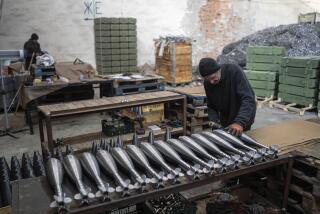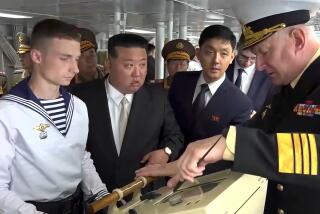Perry Visits Refitted Arms Plant in Russia : Military: Defense secretary is inspecting conversion projects in four ex-Soviet republics. He calls the one outside Moscow a security ‘win.’
- Share via
FRYAZINO, Russia — Gathering ammunition for a battle with Congress over the need to help Russia disarm, Defense Secretary William J. Perry visited this once-secret military industrial city Sunday to see how U.S. money has helped one plant switch from building missile-guidance systems to manufacturing hearing aids.
A U.S.-Russian joint venture to convert the Istok microwave electronics compound to civilian production drew Perry to this depressed company town 25 miles northeast of Moscow because it is the first successful project to put Russia’s multitudinous defense force to work on consumer goods.
“This program is a win--a victory for the Russian economy, a victory for American business and a victory for the security of both the United States and Russia,” Perry told workers assembled at Istok-Audio International, which has been producing 1,000 low-cost hearing aids a month in partnership with New Hampshire-based Great-Union International.
Since embarking on a weeklong inspection of defense-conversion projects in Ukraine, Russia, Kazakhstan and Uzbekistan, Perry has pressed the White House argument that helping former Soviet republics dispose of their weapons and refit military plants for peaceful uses is a sound investment in mutual security.
But Istok, which at its Cold War zenith employed 24,000 people, also provided a sobering reminder of the huge task that lies ahead in reducing the military threat in a country that for decades spent at least one-quarter of its budget on defense.
The hearing-aid venture costing the U.S. government nearly $6 million in “seed money” has created jobs for only 140 of Istok’s workers, while most of the other 7,000 still employed at the factory are idle or continue producing components for weapons of mass destruction.
“We’ll never be able to go into one of these big facilities and convert them over fully,” said Fred S. Hudson, country director for the International Executive Service Corps, a group of retired U.S. business people helping in the birth of the first conversion projects.
*
Nonetheless, he said, “as a taxpayer, I see this as a good program, especially when you consider what it would cost to keep trying to match the threat.”
Ivan I. Klimachev, general director of the Istok-Audio plant, estimated that it will take at least two years to expand consumer operations to employ as many as 2,000 workers.
Istok is one of four facilities under conversion with U.S. assistance through the “cooperative threat-reduction” program for which Sens. Sam Nunn (D-Ga.) and Richard G. Lugar (R-Ind.) succeeded in getting $400 million in annual financing from Congress.
But Russian government plans to sell nuclear technology to Iran and the Kremlin’s brutal offensive against secessionist rebels in the republic of Chechnya have spurred conservative U.S. lawmakers to threaten an end to aid, even for swords-into-plowshares ventures aimed at curbing the nuclear threat.
Perry deemed projects like Istok to be evidence that the once-adversarial superpowers remain committed to disarmament, and he suggested that efforts to tie U.S. assistance to the issues of the Iranian nuclear deal or the war in Chechnya would be misguided.
“What we are doing here, as exemplified today . . . is making good and positive progress we want to proceed with, and we don’t want to tie this with other issues,” he said.
Accompanying Perry on his tour of the four former Soviet republics are 10 chief executives from major U.S. companies looking for investment opportunities in defense conversion, as well as officials of the U.S. government-backed Overseas Private Investment Corp., which provides political risk insurance and loan guarantees for selected projects.
U.S. funds are also being used in Ukraine to finance the dismantling of weapons under the Strategic Arms Limitation Talks treaty and to improve living conditions for soldiers and officers who have been pensioned off.
More to Read
Sign up for Essential California
The most important California stories and recommendations in your inbox every morning.
You may occasionally receive promotional content from the Los Angeles Times.














